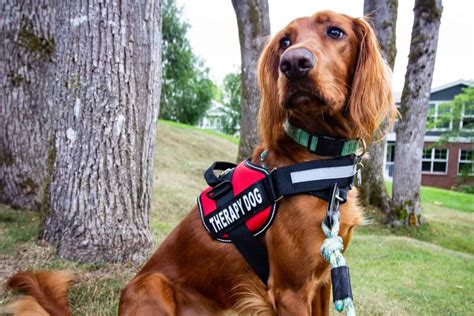Discover the qualities and benefits of therapy dogs, top breeds, certification process, and training. Learn how to evaluate and select the perfect therapy dog.
Understanding Therapy Dogs
Therapy dogs are specially trained canines that offer comfort and support to individuals in hospitals, nursing homes, schools, and other facilities. They are different from service dogs in that they are trained to provide emotional support rather than perform specific tasks for individuals with disabilities. Therapy dogs are known for their gentle and friendly nature, making them the perfect companions for those in need.
These dogs are not limited to any specific breed, as long as they have the right temperament and are well-behaved. However, breeds that are commonly chosen as therapy dogs include Labrador Retrievers, Golden Retrievers, Poodles, Beagles, and Collies. These breeds are known for their sociable and calm demeanor, which makes them perfect for interacting with a variety of individuals.
Therapy dogs undergo rigorous training to ensure they are well-behaved and able to handle different environments and situations. They are also required to pass a temperament test to ensure they can remain calm and gentle when interacting with different people. Understanding the role and qualities of therapy dogs is essential in order to appreciate the impact they have on the lives of those they serve.
Qualities of a Therapy Dog
Therapy dogs are specially trained to provide comfort, affection, and support to people in various settings, such as hospitals, nursing homes, schools, and disaster areas. The best therapy dog breeds for emotional support possess specific qualities that make them well-suited for this important role. One of the most important qualities of a therapy dog is their temperament. They must be friendly, patient, and gentle, with a calm and predictable nature. This allows them to interact safely with a wide range of people, including those who are elderly, disabled, or experiencing emotional distress.
Another key quality of a successful therapy dog is their training and socialization. They should be well-behaved and obedient, responding to basic commands and following rules and boundaries. This helps them to maintain a controlled and safe environment for the people they interact with. Additionally, therapy dogs should have good social skills and be comfortable in various environments and around unfamiliar people. This allows them to adapt to different situations and interact positively with the individuals they are providing support to.
Furthermore, the best therapy dog breeds for emotional support demonstrate empathy and intuition. They should be able to sense the needs and emotions of the people they are visiting, providing comfort and companionship in a gentle and non-intrusive manner. This ability to connect and empathize with others is crucial for their role in offering emotional support and improving the well-being of those they interact with.
Evaluation and Selection Criteria
Best Therapy Dog Breeds for Emotional Support
When it comes to choosing the best therapy dog breeds for emotional support, there are several important evaluation and selection criteria to consider. First and foremost, it is essential to look for breeds that are known for their gentle and affectionate nature. Dogs that are naturally friendly and outgoing tend to make excellent therapy dogs, as they are able to interact with a wide range of individuals in a calm and reassuring manner.
Another important criteria to consider is the size and physical characteristics of the breed. It is often beneficial to select therapy dog breeds that are small to medium in size, as they are more easily portable and can comfortably interact with individuals in a variety of settings. Additionally, the breed’s coat type and grooming needs should be taken into account, as therapy dogs need to be well-groomed and presentable for their interactions with others.
Lastly, the breed’s energy level and trainability are crucial factors to consider when evaluating and selecting therapy dog breeds. Dogs that are highly trainable and have a moderate energy level tend to excel in therapy work, as they are able to focus on their tasks and remain calm and composed in various environments. Overall, the evaluation and selection criteria for therapy dog breeds should focus on finding dogs that possess the qualities necessary to provide emotional support and comfort to those in need.
Top Therapy Dog Breeds
Top Therapy Dog Breeds
When it comes to selecting the best therapy dog breed for emotional support, it’s important to consider several factors. One important factor to consider is the temperament of the breed. Golden Retrievers are known for their friendly and gentle nature, making them excellent candidates for therapy work. Another important factor is the size of the breed. Labrador Retrievers are not only friendly and gentle, but their medium size makes them suitable for indoor and outdoor therapy work. Additionally, the breed’s trainability is a crucial factor. Poodles are highly intelligent and easily trainable, making them great therapy dog breeds.
Another top therapy dog breed for emotional support is the Collie. Collies are known for their loyalty and sensitivity, making them great companions for individuals in need of emotional support. Additionally, the Beagle is also a top therapy dog breed due to their friendly and sociable nature. Their small size and adaptability make them well suited for therapy work in various settings.
It’s important to keep in mind that while these breeds are generally well-suited for therapy work, individual temperament and training play a significant role in determining a dog’s suitability as a therapy dog. When considering a therapy dog, it’s essential to assess the specific needs of the individuals they will be providing emotional support to, as well as the environment in which they will be working. Ultimately, the best therapy dog breed for emotional support will be one that is well-trained, socialized, and able to exhibit calm and comforting behavior in a variety of situations.
Training for Therapy Work
When it comes to training a dog for therapy work, it’s important to focus on specific qualities and behaviors that are necessary for this type of work. A therapy dog needs to be calm, friendly, and well-behaved in various environments and around different types of people. They also need to be able to handle and respond to different situations and environments. Training for therapy work involves teaching the dog to stay calm in stressful or unfamiliar situations, to interact gently with people of all ages and abilities, and to follow commands reliably.
Another important aspect of training for therapy work is socialization. Therapy dogs need to be comfortable and confident in various social situations, so socialization from a young age is crucial. This includes exposure to different people, places, and experiences to help the dog become more adaptable and at ease in new surroundings. Training should also focus on desensitization to loud noises, crowds, and other potentially stressful stimuli that the dog may encounter during therapy work.
Furthermore, training for therapy work should also include obedience training and specialized commands that are specific to the tasks and interactions the dog will encounter in a therapy setting. This may include commands to sit quietly next to a person, stay in place, or greet people in a gentle manner. Consistent and positive reinforcement training methods are typically used to instill these behaviors, as therapy dogs need to be reliable and predictable in their actions and responses.
Benefits of Therapy Dogs
Therapy dogs are specially trained to provide comfort and support to people in need. They offer immense emotional and psychological benefits to individuals in various settings such as hospitals, nursing homes, schools, and disaster areas. The presence of therapy dogs has been shown to reduce stress, anxiety, and depression in those they interact with.
Furthermore, therapy dogs can help improve physical health by encouraging patients to engage in physical activities and providing them with a sense of purpose and companionship. They can also assist in accomplishing therapy goals such as improving motor skills, increasing mobility, and enhancing overall well-being.
In addition, the unconditional love and nonjudgmental nature of therapy dogs can significantly boost social and emotional connections in individuals. They provide a source of comfort and security, reduce feelings of loneliness, and promote positive interactions among people, ultimately contributing to an overall improvement in mental and emotional well-being.
Therapy Dog Certification Process
Therapy dogs play an important role in providing emotional support to individuals in various settings. In order to be certified as a therapy dog, the canine must undergo a thorough evaluation process to ensure they possess the necessary qualities and temperament to interact with people in need. The certification process is designed to assess the dog’s behavior, obedience, and ability to remain calm and well-behaved in different environments.
One of the key components of the therapy dog certification process is the assessment of the dog’s socialization skills. A potential therapy dog must be comfortable interacting with a wide range of people, including strangers, children, and individuals with disabilities. The dog’s ability to remain calm and friendly during these interactions is crucial in determining their suitability for therapy work.
Additionally, the certification process includes evaluating the dog’s obedience and willingness to follow basic commands. Therapy dogs must be well-trained and responsive to their handler’s cues, as they will be expected to remain under control and provide comfort to individuals in distress. Once a dog successfully completes the certification process, they are deemed fit to participate in therapy work and provide much-needed emotional support to those in need.
Frequently Asked Questions
What are some of the best therapy dog breeds for emotional support?
Some of the best therapy dog breeds for emotional support include Golden Retrievers, Labrador Retrievers, Poodles, and Cavalier King Charles Spaniels.
What traits make a dog suitable for providing emotional support?
Dogs suitable for providing emotional support are typically friendly, calm, gentle, and have a natural ability to form strong bonds with their human companions.
Are there specific training requirements for therapy dogs?
Yes, therapy dogs require specialized training to be well-behaved, comfortable in different environments, and to properly interact with people who may need emotional support.
Can any dog breed be a therapy dog?
While any breed of dog can potentially provide emotional support to their owners, certain breeds are better suited for formal therapy work due to their temperament and behavior.
How do therapy dogs benefit individuals in need of emotional support?
Therapy dogs can reduce stress and anxiety, provide companionship, improve mood, and offer a sense of comfort and security for individuals in need of emotional support.
What are the responsibilities of a therapy dog owner?
Therapy dog owners are responsible for ensuring their dog’s well-being, maintaining their training and behavior, and coordinating visits to provide emotional support to those in hospitals, nursing homes, or other facilities.
Can therapy dogs provide emotional support outside of formal settings?
Yes, therapy dogs can also provide emotional support to their owners at home, in public spaces, or during stressful situations, offering comfort and companionship in various settings.





